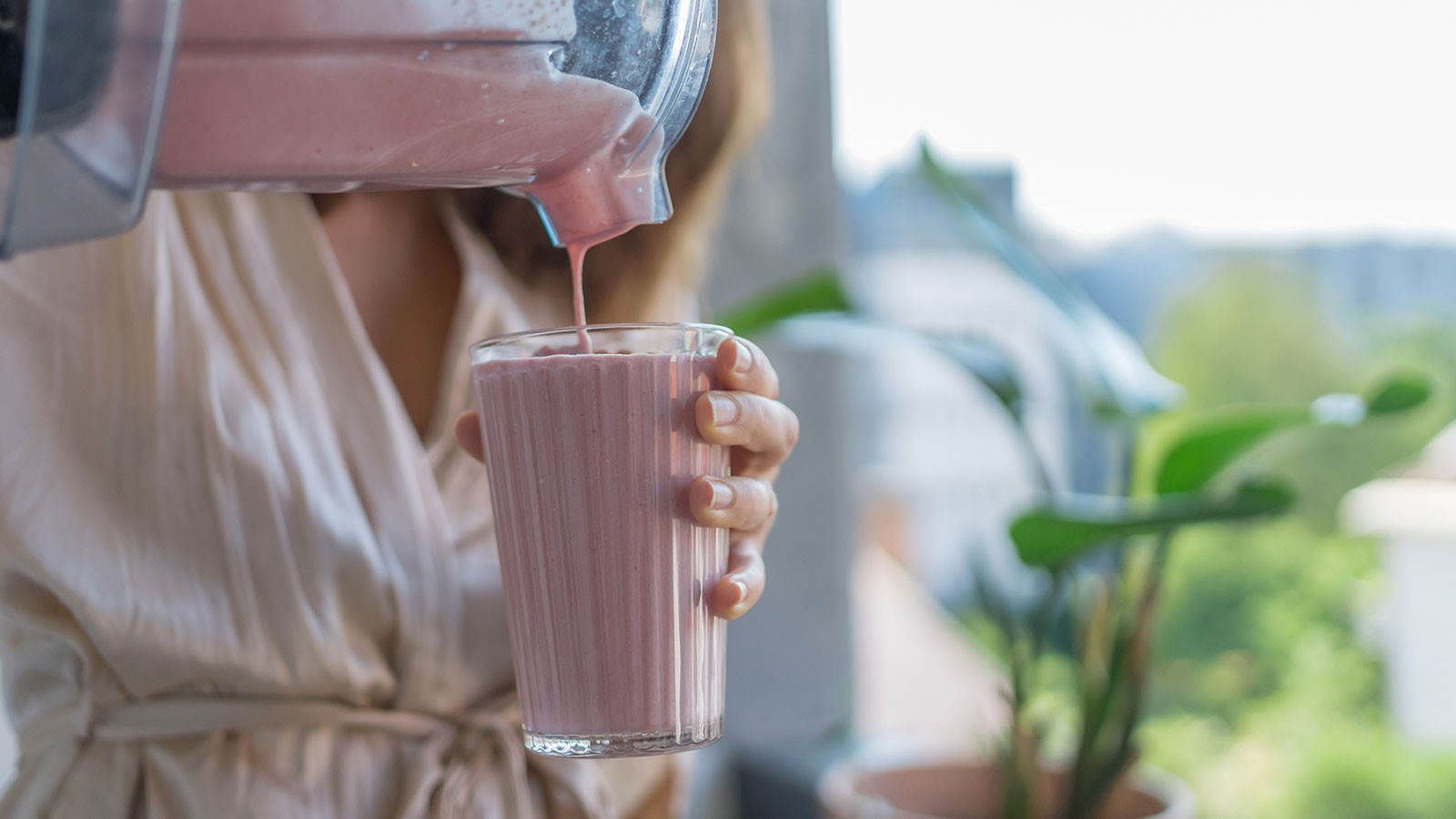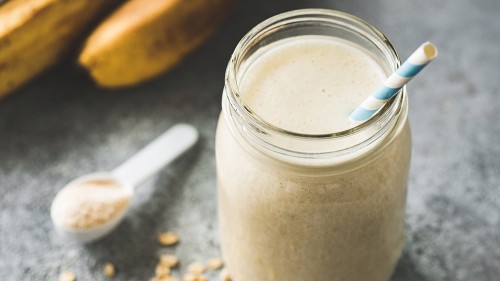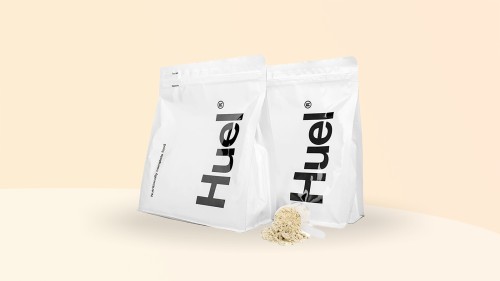Meal Replacement Shakes: Exploring the Research on Weight Loss
Last Updated on February 8, 2024
Dietitian Reviewed Ana Reisdorf, MS, RD
This article explores the scientifically proven effectiveness of meal replacement shakes for weight loss and its downsides and limitations.


Key Highlights
- Meal replacement shakes provide more balanced nutrition than fast food when you're pressed for time.
- Research shows people lose more weight in the short term when incorporating meal replacement shakes versus just traditional diets.
- Shakes are convenient but won't teach healthy eating habits needed for long-term weight management.
- Choose shakes with protein, fiber and nutrients, but without unhealthy sugars or artificial ingredients.
- People often regain the weight lost from meal replacement shakes once they return to regular food.
Running late in the morning? Can’t leave your desk for lunch?
There are many times throughout your day when squeezing in a homemade meal is nearly impossible. Our busy lifestyles fuel the need for convenient and nutritious on-the-go meals when we’re pressed for time.
You may be looking for alternatives to greasy drive-thru food or the not-so-fresh gas station sandwiches, and meal replacement shakes may be the answer for you.
Meal replacement shakes are ready-to-drink bottled shakes or powdered supplements that provide a nutrient profile comparable to a well-balanced meal.
A well-balanced meal replacement shake will contain an ideal mix of protein, carbohydrates, and healthy fats. They generally provide 200–400 calories per shake, some fiber, and a variety of vitamins and minerals.
Many people use meal replacement shakes for weight loss as they are calorie-controlled and provide a convenient and healthy alternative to more high-calorie foods.
You may be wondering if meal replacement shakes are healthy. Or if going on a meal replacement shake diet will help you lose weight.
Let’s discuss the potential benefits and drawbacks of meal replacement shakes.
Potential Benefits
While the ingredients in meal replacement shakes will vary, here are some potential benefits of incorporating them into your lifestyle.
May Help You Replace an Unhealthy Meal
Meal replacement shakes provide a healthier, more well-balanced meal than convenience foods or fast food.
Planning, shopping, meal prepping, and cleaning can take a considerable amount of time and energy.
One of the biggest hurdles to weight loss is the time and effort it takes to plan and prepare three meals a day, every day.
Many individuals and families turn to convenience foods or fast food for a quick and easy meal.
Unfortunately, these highly processed meals are loaded with unhealthy fats, simple carbohydrates, sodium, and sugar that can ultimately derail your weight-loss efforts.
In fact, one 2018 study suggested that eating fast food with some regularity not only contributes to weight gain but may also kill more people prematurely than cigarette smoking. (1)
Researchers also suggested that simple carbohydrate intake from fast foods may not just lead to weight gain and diabetes, but it may also increase dementia, mental illness, and cancer risk.
May Help With Weight Loss
Meal replacement shakes may help you lose weight because they often contain fewer calories than a traditional meal and provide protein, which may help you feel fuller for longer.
Additionally, meal replacement shakes are pre-portioned, which can eliminate the option for a second or third serving.
Furthermore, the research on meal replacement shake diets shows some promise as a weight-loss solution.
One 2019 systematic review and meta-analysis sought to analyze the effectiveness of meal replacement shakes on weight loss for one year on people who are overweight or obese, compared with interventions that do not include meal replacements. (2)
Researchers found that incorporating meal replacements leads to significantly greater weight loss for one year than other weight loss programs that provide more traditional meals.
One older study suggested that using meal replacements may result in greater weight loss, increased compliance, were more likely to ensure sufficient intakes of essential nutrients, and showed higher satisfaction and lower drop-out rates than other diets. (3)
May Provide Essential Nutrients That May Be Lacking
Meal replacement shakes are designed to provide a balanced blend of carbohydrates, protein, fat, and essential vitamins and minerals. These shakes can be an essential source of vitamins and minerals to prevent nutrient deficiencies.
If you’re not eating a well-balanced diet on a regular basis, you may not be getting all of the nutrients your body needs.
This may be especially true if you’re cutting back on calories to help prompt your weight-loss efforts.
One 2017 study found that nearly one-third of the U.S. population aged over 9 years is at risk of deficiency in at least one vitamin. (4)
Potential Drawbacks
While there are some benefits to using meal replacement shakes for weight loss, there are some drawbacks as well.
May Not Be a Solution for Sustainable Weight Loss
Meal replacement shakes may help you drop a few pounds in the short term, but you’ll likely gain the weight back when you ditch the shake diet for actual food.
Meal replacements aren’t sustainable because they aren’t as satisfying as real food.
The most successful long-term weight maintenance programs involve a more detailed weight-loss plan, regular physical activity, and support from a healthcare professional.
While they are easy and convenient, meal replacement shakes don’t teach you how to prepare your own well-balanced meals or make healthy choices when you’re eating out.
Simply put, they don’t provide a long-term solution for the lifestyle shift needed for sustainable weight loss.
One 2013 report noted that while meal replacement shakes may help you lose weight, you would have to drink them indefinitely instead of meals to sustain that long-term weight loss. (5)
The report’s author suggested that many people regain weight when returning to eating regular foods because they never learned how to control their portion sizes accurately. Consequently, people tend to underestimate the number of calories they consume when meal planning.
They May Contain Unnecessary Added Ingredients
While the ingredient lists vary, many meal replacement shakes can be highly processed and may contain unnecessary and unhealthy ingredients like added sugars, chemical preservatives, and artificial colors and flavorings.
Meal replacement shakes are often made of highly processed or artificial ingredients that don’t offer the quality of nutrition that whole foods will.
Additionally, these diet shakes are typically made with synthetic vitamins and minerals, which are often lower in quality than those found in natural foods.
May Lack Important Nutrients
While meal replacement shakes provide a variety of essential nutrients, they may also not provide an ideal amount of fiber and phytochemicals, both of which have been linked with preventing certain diseases.
Many meal replacement shakes lack adequate amounts of fiber, and eating enough fiber appears to have far-reaching health benefits.
One 2019 meta-analysis and systematic review found that eating fiber-rich foods decreased the risk for heart disease, stroke, type 2 diabetes, and colorectal cancer. (6)
Fiber is also essential for optimal digestion and gut health.
Many meal replacement shakes often lack important phytochemicals. Phytochemicals are compounds in plant-based whole foods like fruits, vegetables, whole grains, nuts, seeds, and legumes.
Eating a variety of phytochemicals has been linked with a decrease in certain types of cancers and heart disease. (7).
How to Choose the Best One for Weight Loss
With such an overwhelming variety of meal replacement shakes to choose from, it can be challenging to know where to start.
The following are some tips on choosing the best meal replacement shakes for weight loss.
Nutritional Content
Not all shakes are created equal, so it’s best to choose a meal replacement shake that is well-balanced and will provide an ideal mix of nutrients.
A well-balanced shake will offer around 300 calories, 15–30 grams of protein, 3–5 grams of fiber, and 10–15 grams of unsaturated fat.
Ingredient List
The best meal replacement shakes will have very little added sugar and sodium and, ideally, no artificial flavors, colors, or sweeteners.
When choosing a meal replacement shake, look for quality plant-based proteins like pea, hemp, or brown rice.
In order to be palatable, your shake will need to be sweetened. Look for natural sugars like brown rice syrup, coconut palm sugar, or cane sugar.
Additionally, the fats in your meal replacement shake should come from plant-based fats like plant-based oils, nuts, or seeds.
Frequently Asked Questions
Are meal replacement shakes healthy?
While eating whole foods is generally an ideal method for getting all of your essential nutrients, meal replacement shakes can be a nutritious and convenient option.
The healthiest meal replacement shakes will provide a balanced mix of carbohydrates, protein, and fats, in addition to essential vitamins and minerals.
Meal replacement shakes should also be free of chemical preservatives and artificial sugars, colors, and flavors.
How much weight can I lose with meal replacement shakes?
The amount of weight you can lose by drinking meal replacement shakes will depend on various factors, including the other foods you may be eating throughout the day and your activity level.
A meal replacement shake will contain on average 300 calories, while most fast food meals contain roughly 830 calories. If you were to replace one fast food meal with one meal replacement shake, you would be creating a 530 calorie deficit. (8)
A daily 530 calorie deficit could potentially lead to a 1–2-pound weight loss per week over time.
What should I look for when buying meal replacement shakes?
When choosing a meal replacement shake, you want to ensure the product provides a balance of nutrients and is free of unhealthy ingredients.
Look for a product with at least 15 grams of protein and at least 3 grams of fiber.
Your meal replacement shake should be low in sugar and sodium and free from artificial colors, flavorings, and sweeteners.
Is it OK to only drink meal replacement shakes?
Meal replacement shakes should not replace healthy, well-balanced, whole-food meals.
Relying solely on meal replacement shakes for your nutrition will increase the likelihood of vitamin and mineral deficiencies.
Furthermore, meal replacement shakes lack adequate fiber and phytonutrients, both of which play an important role in your health and well-being.
The Bottom Line
Swapping a regular meal in favor of a meal replacement shake may provide some benefits, particularly if that regular meal is fast food. That’s because a meal replacement shake provides a healthier, more well-balanced meal than most convenience foods or fast food.
These calorie-controlled shakes may be an effective tool for weight management as they may lead to greater weight loss than more traditional diets.
Additionally, these shakes are designed to provide most of the nutrients you would find in a well-balanced meal and may help to prevent vitamin and mineral deficiencies.
Using a meal replacement shake for weight loss also has some downsides.
Meal replacement shakes aren’t designed for long-term use. Therefore, after returning to eating regular food, you’re likely to gain the weight right back.
Meal replacement shakes are often made of highly processed or artificial ingredients that don’t offer the quality of nutrition that whole foods will.
Furthermore, meal replacement shakes don’t provide adequate fiber and phytochemicals, which provide far-reaching health benefits.
A Word from an RD
In my experience, clients who have started using meal replacement shakes to lose weight generally end up feeling disappointed with the results.
Since meal replacement shakes are not intended for long-term use, many people will gain whatever weight was lost right back after discontinuing the product.
My clients who use meal replacement shakes on occasion as a way to avoid fast food and convenience food are generally pleased as they provide an easy way to cut back on unhealthy, processed foods.
A meal placement shake provides a nice option for busy people who need a quick, convenient, and well-balanced meal. However, not all shakes are created equal.
Look for shakes that use high-quality ingredients free from artificial flavors, colors, chemical preservatives, and added sugars.
Although meal replacement shakes can be a quick alternative to regular food, don’t forget to eat plenty of fruits, vegetables, whole grains, beans, lentils, nuts, and seeds. These whole foods can also help with weight management and provide a host of health benefits.
At WellnessVerge, we only use reputable sources, including peer-reviewed medical journals and well-respected academic institutions.
- The Hidden Dangers of Fast and Processed Food:
https://www.ncbi.nlm.nih.gov/pmc/articles/PMC6146358/ - A systematic review and meta-analysis of the effectiveness of meal replacements for weight loss:
https://onlinelibrary.wiley.com/doi/full/10.1111/obr.12816 - Efficacy of a meal replacement diet plan compared to a food-based diet plan after a period of weight loss and weight maintenance: a randomized controlled trial:
https://www.ncbi.nlm.nih.gov/pmc/articles/PMC2851659/ - Risk of Deficiency in Multiple Concurrent Micronutrients in Children and Adults in the United States:
https://www.ncbi.nlm.nih.gov/pmc/articles/PMC5537775/ - Meal Replacement Shakes and Nutrition Bars: Do They Help Individuals With Diabetes Lose Weight?:
https://spectrum.diabetesjournals.org/content/26/3/179 - Carbohydrate quality and human health: a series of systematic reviews and meta-analyses:
https://www.thelancet.com/journals/lancet/article/PIIS0140-6736(18)31809-9/fulltext - Antioxidant Phytochemicals for the Prevention and Treatment of Chronic Diseases:
https://www.ncbi.nlm.nih.gov/pmc/articles/PMC6331972/ - Consumers’ estimation of calorie content at fast food restaurants: cross sectional observational study:
https://www.ncbi.nlm.nih.gov/pmc/articles/PMC3662831/






